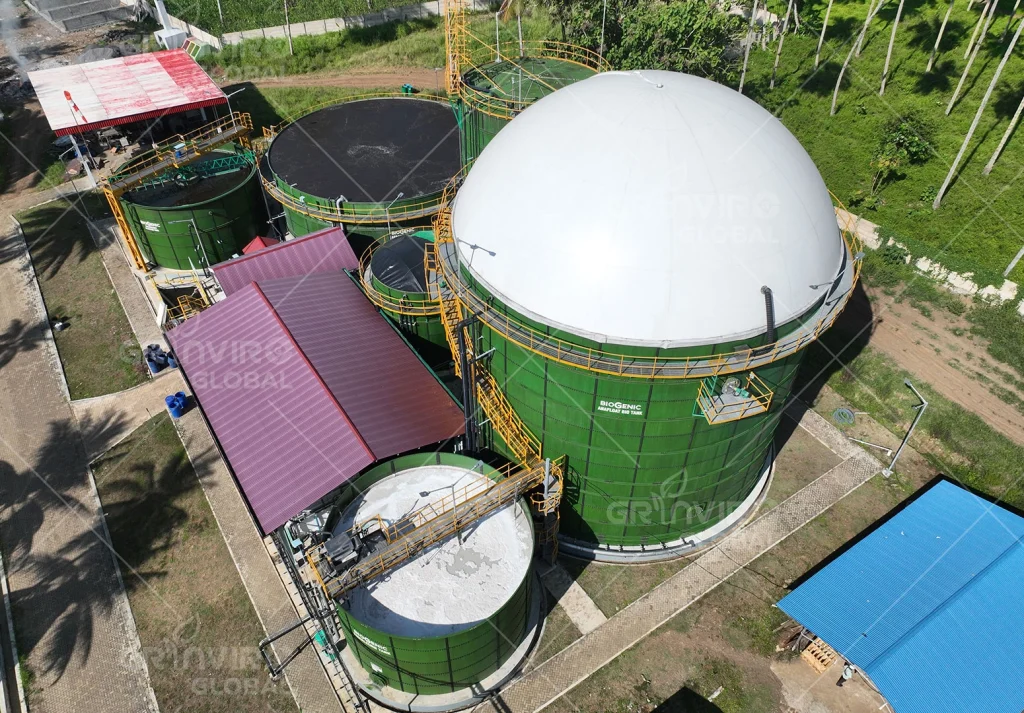In recent years, the global push for sustainability has driven significant advances in POME wastewater treatment technologies, particularly in industries that generate large volumes of organic waste. One such industry is the palm oil sector, which produces large amounts of Palm Oil Mill Effluent (POME). POME is a byproduct of palm oil milling, known for its high organic content, making it a major environmental concern.
However, innovative biogas technologies have emerged as effective solutions to treat POME wastewater while offering numerous environmental and economic benefits. Among these, Grinviro’s BIOGENIC Waste to Energy stands out as an advanced technology poised to revolutionize the treatment of POME wastewater. This article will explore the role of innovative biogas technologies in POME treatment and how Grinviro’s solution can play a crucial role in mitigating environmental impacts.
Understanding POME Wastewater
Palm Oil Mill Effluent (POME) is the liquid waste produced during the palm oil extraction process. It is generated when fresh fruit bunches are processed in a palm oil mill, and it contains high concentrations of organic matter, fats, oils, and nutrients. POME has a high Chemical Oxygen Demand (COD) and Biological Oxygen Demand (BOD), which can severely impact aquatic life if released untreated into water bodies. Additionally, the presence of high levels of suspended solids, oils, and grease makes POME a significant challenge for wastewater treatment plants.
The treatment of POME has traditionally been a costly and energy-intensive process, often resulting in environmental pollution if not properly managed. As such, effective treatment solutions are critical not only for compliance with environmental regulations but also for sustainable palm oil production.
Sustainable POME Wastewater Treatment: Using Biogas for Renewable Energy
POME (Palm Oil Mill Effluent) wastewater is a byproduct of the palm oil milling process that contains high levels of organic matter, which can be harmful if left untreated. Traditional treatment methods such as lagoons or aerobic treatments have been used, but they often fail to fully capture the potential of POME as a renewable energy source. Modern approaches focus on the use of anaerobic digestion for POME treatment, which not only reduces the environmental impact of the wastewater but also allows for the production of biogas, a valuable renewable energy resource.
The anaerobic digestion process involves using microorganisms to break down organic material in the absence of oxygen, leading to the production of biogas primarily composed of methane. This biogas can then be captured and used for energy production, reducing reliance on fossil fuels. Additionally, anaerobic treatment reduces the sludge volume and minimizes the greenhouse gas emissions compared to traditional treatment methods.
Benefits of POME wastewater treatment for biogas production include:
- Renewable energy generation: Biogas can be utilized to produce electricity, heat, or even fuel, providing an eco-friendly alternative to conventional energy sources.
- Reduction in greenhouse gas emissions: The methane captured from POME prevents it from being released into the atmosphere, mitigating the impact of global warming.
- Cost-effective: The energy generated from biogas can offset the operational costs of the palm oil mill, making the process more economically sustainable.
Innovative Technologies BIOGENIC Waste to Energy By Grinviro

Grinviro’s BIOGENIC Waste to Energy solution is a cutting-edge biogas technology that offers a highly efficient and sustainable method for POME wastewater treatment. As part of Grinviro’s commitment to creating a greener future, BIOGENIC integrates the latest innovations in anaerobic digestion and biogas technology to provide a holistic solution for palm oil mills.
The BIOGENIC Waste to Energy system is designed to efficiently treat POME while simultaneously generating renewable energy. The system employs advanced anaerobic digestion technology to break down the organic waste in POME, producing high-quality biogas. This biogas can then be used to generate electricity, which can power the treatment process or be sold to the grid, providing a valuable revenue stream for palm oil mills.
Key benefits of Grinviro’s BIOGENIC Waste to Energy solution include:
- Reduced Discharge Cost: The BIOGENIC system significantly lowers the cost of wastewater discharge by efficiently treating POME and reducing the need for expensive treatment methods or regulatory fines
- Low Total Cost of Ownership: The system is designed for long-term efficiency with minimal operating expenses, ensuring a low total cost of ownership over its lifetime.
- Ease of Operation & Maintenance: The BIOGENIC solution is user-friendly, with simplified operation and low maintenance requirements, allowing operators to focus on other critical aspects of the mill’s operations.
- Increased Biogas Production: The system is optimized to produce higher quantities of biogas, contributing to a more reliable and cost-effective energy supply for the mill while reducing reliance on external energy sources.
By adopting Grinviro’s BIOGENIC Waste to Energy solution, palm oil mills can not only meet regulatory requirements for wastewater treatment but also contribute to a more sustainable and circular economy. The solution aligns with global trends towards renewable energy, waste reduction, and sustainable agriculture, providing a win-win solution for both the environment and the bottom line.
Conclusion
Innovative biogas technologies are transforming the way Palm Oil Mill Effluent (POME) wastewater is treated, providing sustainable solutions that benefit both the environment and the palm oil industry. The advancements in anaerobic digestion, membrane bioreactors, and floating cover digesters have made POME treatment more efficient, cost-effective, and environmentally friendly. Grinviro’s BIOGENIC Waste to Energy solution represents the future of POME wastewater treatment, combining cutting-edge technology with a commitment to sustainability. By adopting such solutions, palm oil mills can effectively manage their wastewater, reduce their environmental impact, and contribute to the global transition to renewable energy.

Visit Us:
- 7th floor,1#Building ,No.200 Sanmen Road ,Yangpu District ,Shanghai ,China
- The Prominence Office Tower Lt. 28, Jl. Jalur Sutera Barat, Tangerang
- Jl Utama Modern Industri Blok AA No.5, Kawasan Modern Industri Cikande
- Ciputra World Office Surabaya Lt. 29, Jl. Mayjen Sungkono, Surabaya
- Pattene Business Park Blok W3a Makassar
